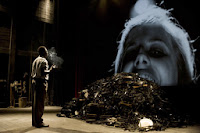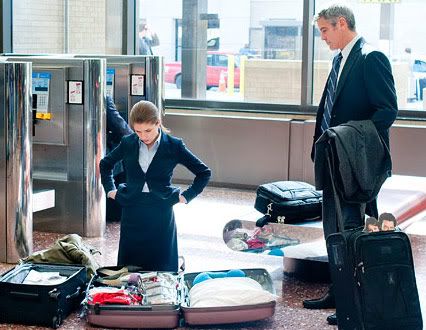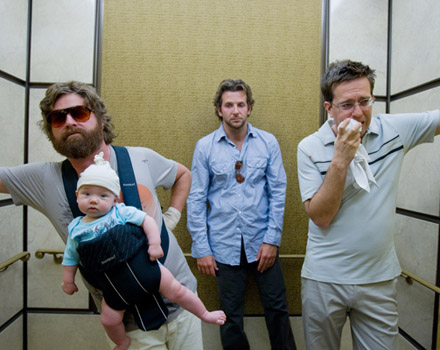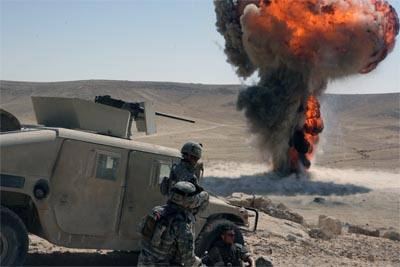
Who said history has to be accurate? Don't tell that to Quentin Tarantino, who pulled off his newest masterpiece in a brilliant revisionist style. "Inglourious Basterds" is the work of a world-class auteur at the top of his game.
When I first heard years ago that Tarantino was developing a war film, I was hesitant, unsure of whether Tarantino's directing style could fit into a war movie. But then I realized, it is the perfect genre for him.
Of all of Tarantino's films, "Inglourious Basterds" has the most traditional narrative structure. While all of his other films hop through time in no particular order, this one moves through time in order with only a few brief flashbacks. What's extremely unconventional about it though, are it's multiple different stories that only loosely connect.
The first story starts in the early days of World War II, in Nazi occupied France. Shosanna Dreyfus (Melanie Laurent), is a French Jew who narrowly escapes death at the hands of brutal Nazi Col. Hans Landa (Christoph Waltz). Four years later, Dreyfus is still living in France under a pseudonym, operating a movie theater and hoping to one day get revenge on the Nazis.
The second story focuses on a group of Jewish American soldiers also in France. This troop, nicknamed the Basterds, also plans to get revenge on the Nazis and their reign of terror. The troop is led by Lt. Aldo Raine (Brad Pitt). Raine commands his soldiers to attack the Nazis with absolutely no sympathy. He also demands that each man bring him 100 Nazi scalps (and he gets his scalps).
Now, where do these two stories connect? Well, both are revenge missions, and both seek their revenge in the exact same place. Shosanna and the Basterds never meet face to face, but all I can say is that if they ever were to meet, they'd all be pretty good friends.
In almost every way, "Inglourious Basterds" shouldn't be a good movie. It has long expanses of meaningless dialogue, little action, and major historical inaccuracies and politically incorrect stereotypes. It's kind of like "Lawrence of Arabia." But these things don't serve to make the movie worse; they end up making it even better. Only a mind like Tarantino can take flaws and turn them into idiosyncrasies. Only Tarantino could capture people talking and turn it into amazing, real conversations about the meaning of life. The dialogue is harder to quote because most of the film is spoken in either German or French, However, Raine and Donny "The Bear Jew" Donowitz (Eli Roth) give more than enough catchphrases to go around.
Oh, and that dialogue. No matter what language, Tarantino's dialogue is always so pleasant to listen to; not a single word out of a character's mouth ever seems corny or contrived.
And yes, the movie is violent. Very violent. On the Tarantino violence scale, it would rank slightly higher than "Pulp Fiction" but slightly less in "Kill Bill." The violence is often ridiculous, but is also somehow the most realistically violent of all of his films.
Tarantino has a habit of reviving the careers of many once great actors (John Travolta, Michael Parks, Pam Grier, David Carradine). The careeer revived in "Inglourious Basterds" is that of Christoph Waltz. Much has been said about Waltz's performance, and every accolade is well deserved. He plays Landa as both friendly and creepy at the same time. He can seem friendly by making small talk and then intimidating by doing something like ordering someone to get him milk. He is never a villain who seems psychotic, he just seems scary because of his overstated friendliness. It is without a doubt that Landa's Cannes winning performance will also get nominated for an Oscar.
The true villains of World War II, Hitler and Joseph Goebbels, are played here with perfect inaccuracy. Martin Wuttke plays Hitler as a whiny baby and Sylvester Groth plays Goebbels as a soulless zombie and something of a suck up. While Waltz has gotten the majority of praise, a large amount of it belongs to Groth. Through Groth's eyes, Goebbels doesn't seem like a zombie just from the things he says, but also from the things he does. In one scene, he shakes Shosanna's hand but he doesn't quite give it a tight grip. In fact, he barely grabs it with his cold, white hand. It looks almost like a skeleton who can walk and talk.
Also scoring points are the Basterds. I always knew Pitt was talented, but not even his performance in "Fight Club" can top this. His Aldo Raine comes from Tennessee, and he talks in a perfect Southern droll. Roth is also a scene stealer. Roth is known for directing torture porn like "Hostel." However, he should stick to acting. His overly hammy Boston accent becomes one of the funniest parts of the movie. And yes, the movie is funny. Tarantino's sense of humor is one of the darkest in cinema; many of the jokes here are dark as ever. However, many are as light and hilarious as Raine's horrible grip on the Italian language. A scene like that almost feels like something out of a Sacha Baron Cohen movie.
Tarantino is known for referencing hundreds and hundreds of movies in everyone of his films. In this one, he often draws references to his own films. The opening scene reminded me something of the Royale with Cheese scene in "Pulp Fiction." Like Jackson, Waltz first disarms the character through light banter before suddenly unloading on him. The revenge mission feels almost like The Bride's in "Kill Bill."
Tarantino also references many of his favorite movies. You can see a shot that looks like "Scarface" or a camera movement that feels Hitchcockian. What's referenced most here though is Spaghetti Westerns. Spaghetti Westerns were Italian westerns that were made in the late 1960s popularized mainly by Sergio Leone. As I watched "Inglourious Basterds" I realized what it truly was: a Spaghetti Western presented as a war film. There are Mexican standoffs and a score that often resembles the brilliant music of Ennio Morricone.
The plot of "Inglourious Basterds" is almost directly based off of the plot of "Once Upon a Time in the West." Like "Once Upon a Time in the West," "Inglourious Basterds" is about two different people getting revenge on the same person for different reasons. Both reasons however, have something to do with the loss of family or brotherhood. "Inglourious Basterds" also contains long stretches without much action. However, while Leone reveled in long silences, Tarantino revels in lots and lots of talking.
"Once Upon a Time in the West" is also the best western ever made. "Inglourious Basterds" is one of the best war movies ever made. Not only that, but it is also the most audacious for daring to change the face of history. It really makes sense as to why "Inglourious Basterds" is so revisionist: every Tarantino movie exists in its world with its own interconnecting characters and its own brands. Even though "Inglourious Basterds" doesn't take place during modern times, it feels as if it could've taken place in the same world as any other Tarantino film.
"Inglourious Basterds" was one of few movies I've seen recently where I left feeling reinvigorated, feeling as if all my faith in cinema had been restored. Only someone like Quentin Tarantino can do this. He reinvented the crime drama, the kung fu film, and now, the war film. Being a great director doesn't involve any film school, just a great imagination and a love for movies. And not to mention, a strange and interesting view of the world.
One more thing: we never find out why the title is misspelled. Tarantino says he'll never explain why, and in a way it's better like that. The spelling is a part of Tarantino's world, and we're lucky that we even got this good of a glimpse of it.
If you liked this movie, you'll also like: Kill Bill, Pulp Fiction, Once Upon a Time in the West, The Dollars Trilogy, Carrie, Scarface, Reservoir Dogs, Jackie Brown, Grindhouse, The Wild Bunch, No Country for Old Men




































